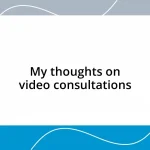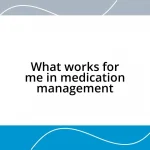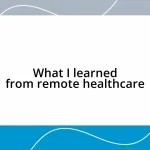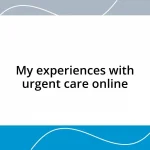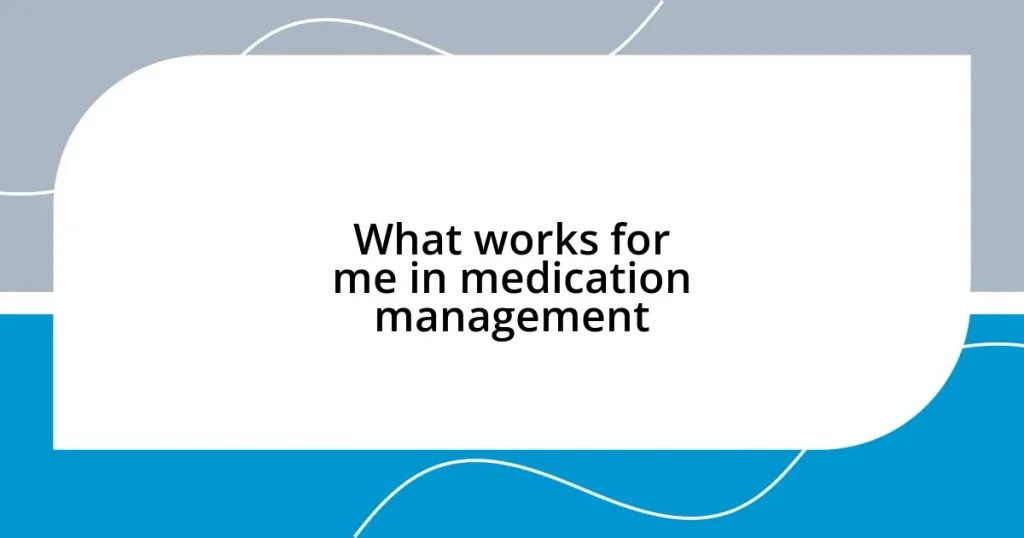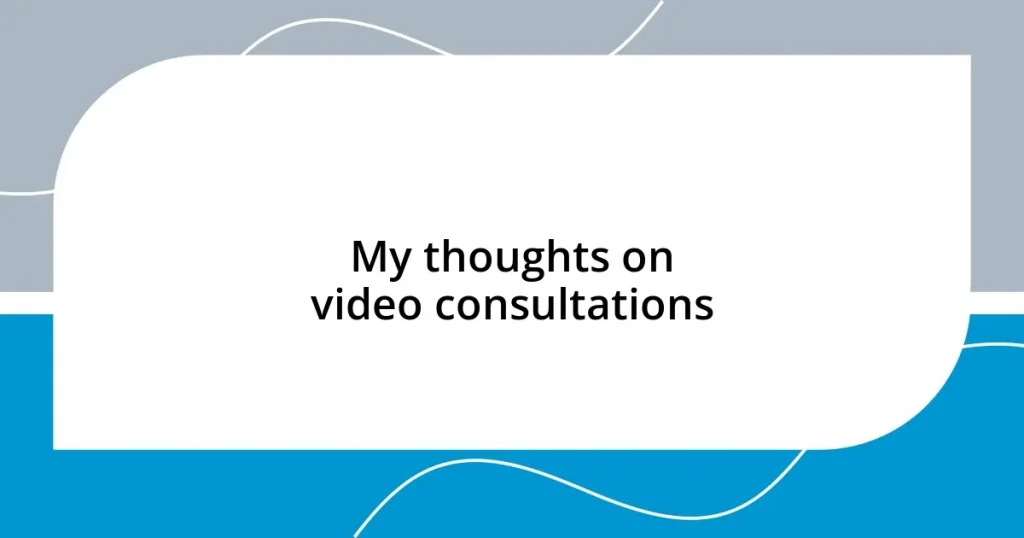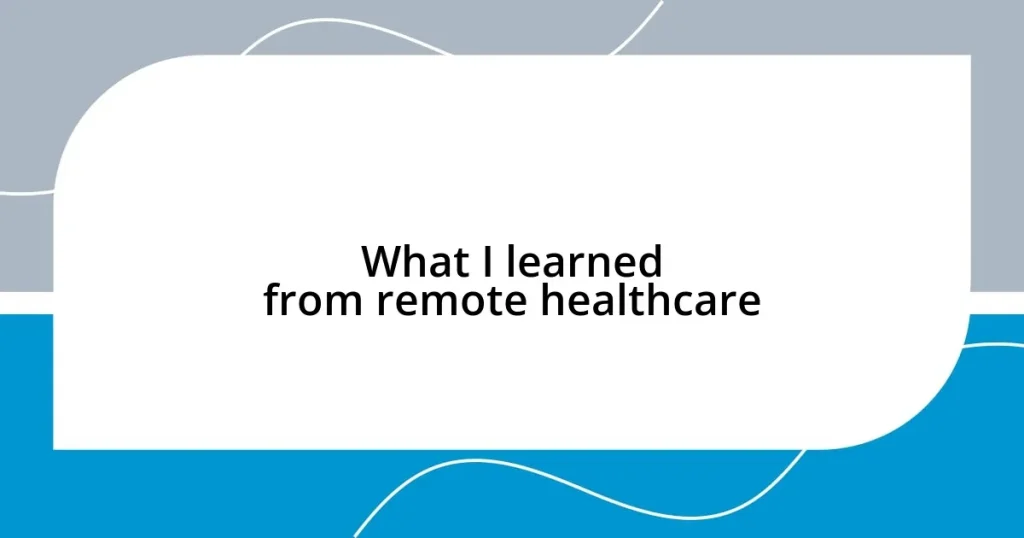Key takeaways:
- Effective medication management relies on clear communication with healthcare providers to foster understanding and trust.
- Consistency in medication routines significantly enhances adherence and helps patients feel more in control of their health.
- Regularly reviewing and adjusting medication plans based on personal feedback can improve overall treatment outcomes and quality of life.
- Utilizing tools such as medication reminder apps, digital organizers, and maintaining a log of side effects can facilitate better tracking and management of medications.
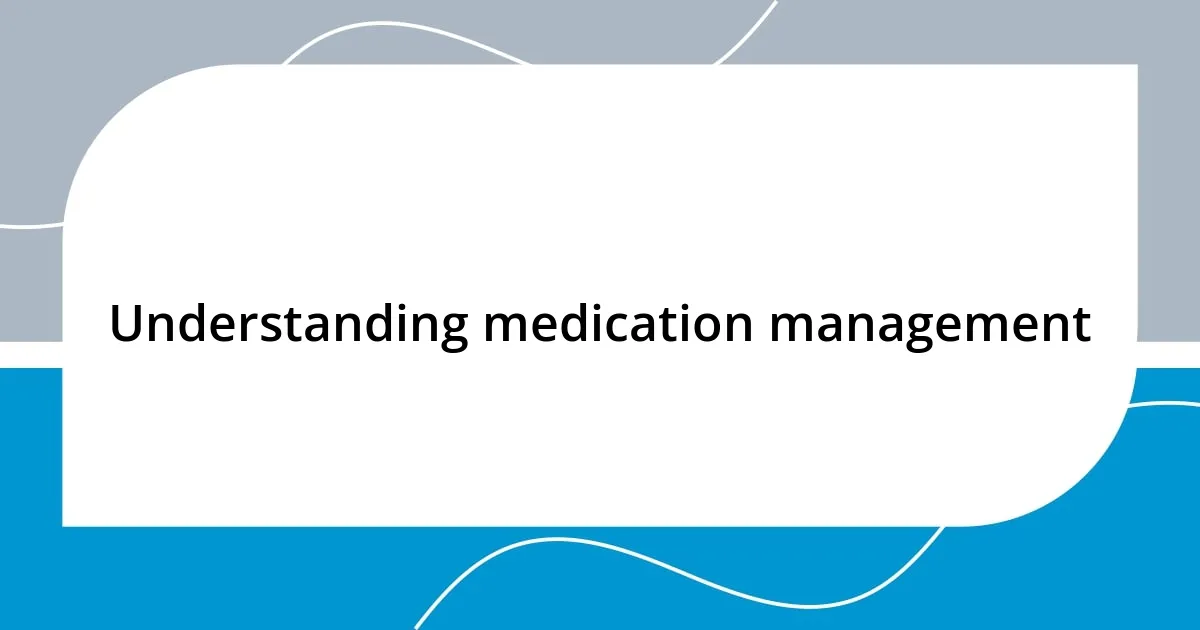
Understanding medication management
Medication management is a critical aspect of health care that ensures patients take their medications correctly and effectively. I remember when a friend of mine struggled with a complicated medication regimen; she spent hours each week trying to organize her pills. It made me realize how vital it is for individuals to have a solid system in place — whether that’s using a pill organizer or setting reminders on their phones.
At its core, medication management is all about understanding individual needs and the specific medications being prescribed. I once had the challenge of switching medications for my anxiety, and honestly, the feedback from my healthcare provider made all the difference. It’s essential to communicate openly — have you ever felt confused about what your prescriptions were for? I know I have, and asking those questions turned my experience from stressful to manageable.
Moreover, it’s not just about adherence; it’s also about safety. When embarking on a new treatment plan, I found it helpful to jot down any side effects and report them back to my doctor. This proactive approach not only improved my treatment experience but also empowered me to take charge of my health. What strategies do you implement to ensure your medication management is successful?
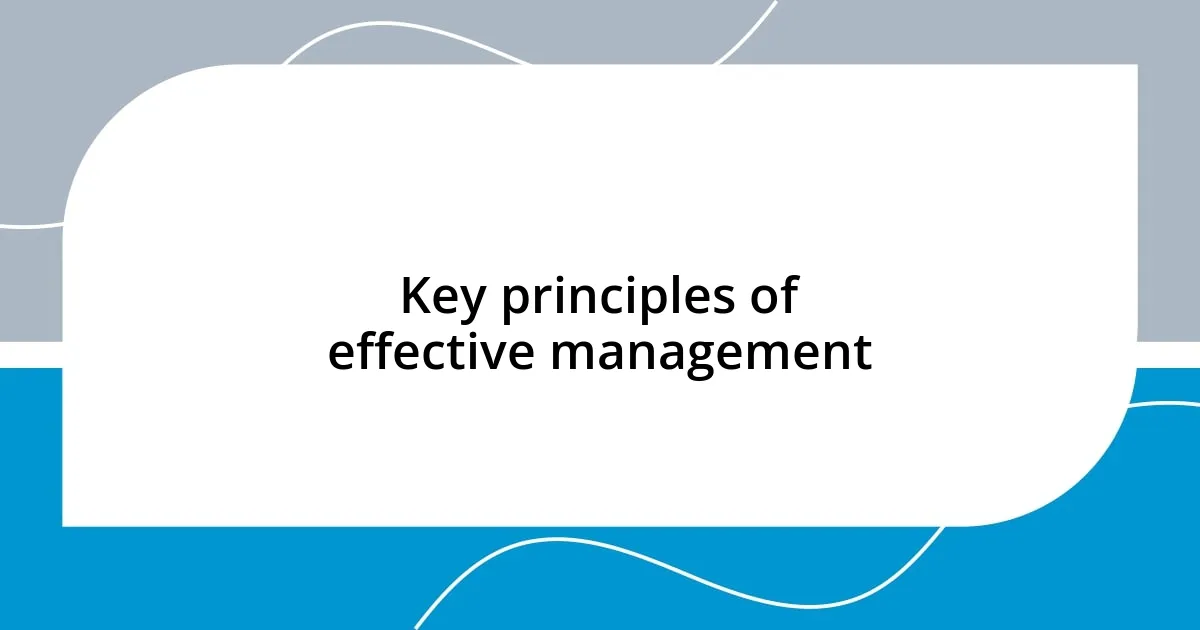
Key principles of effective management
Effective medication management starts with clear communication. I remember sitting in a doctor’s office, a little anxious and overwhelmed by the list of medications prescribed. As I voiced my concerns, my doctor patiently explained each one, comparing their effects and possible interactions. This openness minimized my worries and built trust, which is crucial in any healthcare journey.
Another critical principle is consistency. I’ve found that setting a specific time each day for my medications has transformed the process from a chore into a routine. Just like my morning coffee became a ritual, taking my meds at the same time helped me stay committed. I often think about how habits shape our health and how vital it is to find what works best for us individually.
Lastly, reviewing and adjusting the regimen based on ongoing feedback is essential. I recall a period when I started experiencing side effects I hadn’t anticipated. By keeping a log and discussing it with my doctor, we were able to tweak my regimen, improving my overall experience and wellbeing. It’s a reminder that being proactive doesn’t just enhance compliance; it truly enhances our quality of life.
| Principle | Description |
|---|---|
| Clear Communication | Open dialogue with healthcare providers ensures understanding and trust. |
| Consistency | Establishing a routine helps improve adherence to medication schedules. |
| Regular Review | Assessing and adjusting medication plans based on feedback enhances overall effectiveness. |
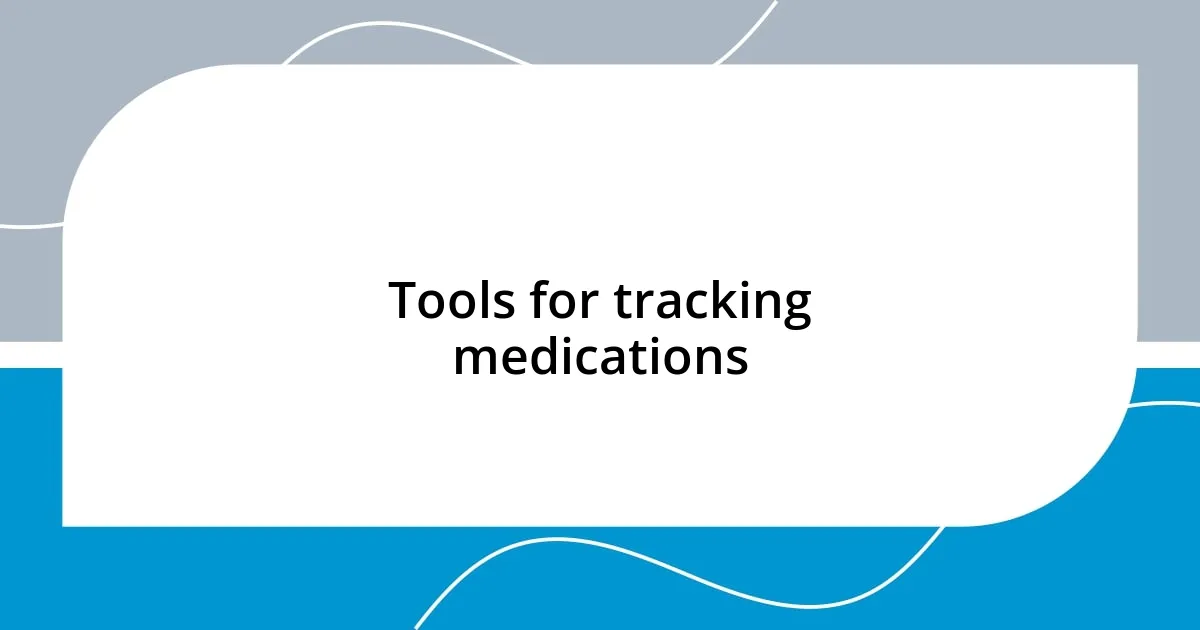
Tools for tracking medications
I’ve discovered that my smartphone has become one of my most valuable partners in managing my medications. Apps designed for medication tracking not only allow me to set reminders but also to log dosages and track refills. The sense of relief I feel when I receive a notification to take my pill—especially on days when my schedule is packed—can’t be overstated. It’s like having a personal assistant dedicated to my health!
Here are some helpful tools I’ve found for tracking medications:
- Medication reminder apps (like Medisafe, MyTherapy): These send notifications when it’s time to take your meds and can even help you monitor your progress.
- Digital pill organizers: Devices that can dispense the right dosage at scheduled times.
- Calendar systems: Whether digital or paper, keeping a visible reminder of your medication schedule boosts adherence.
- Wearable devices: Smartwatches that can push reminders directly to your wrist help keep medications top of mind, even when I’m on the go.
- Logbooks or journals: I’ve started jotting down details about my medications—what I felt, any reactions—which has also helped me remember to discuss these with my healthcare provider during check-ins.
While some people thrive with high-tech solutions, I also found comfort in a good old-fashioned pill organizer. Those little compartments? Lifesavers! They turn an overwhelming task into a simplified visual. Every Sunday, I sit down with my organizer, and it feels almost therapeutic to see my week laid out in front of me. It really gives a sense of control over my health, which is crucial.
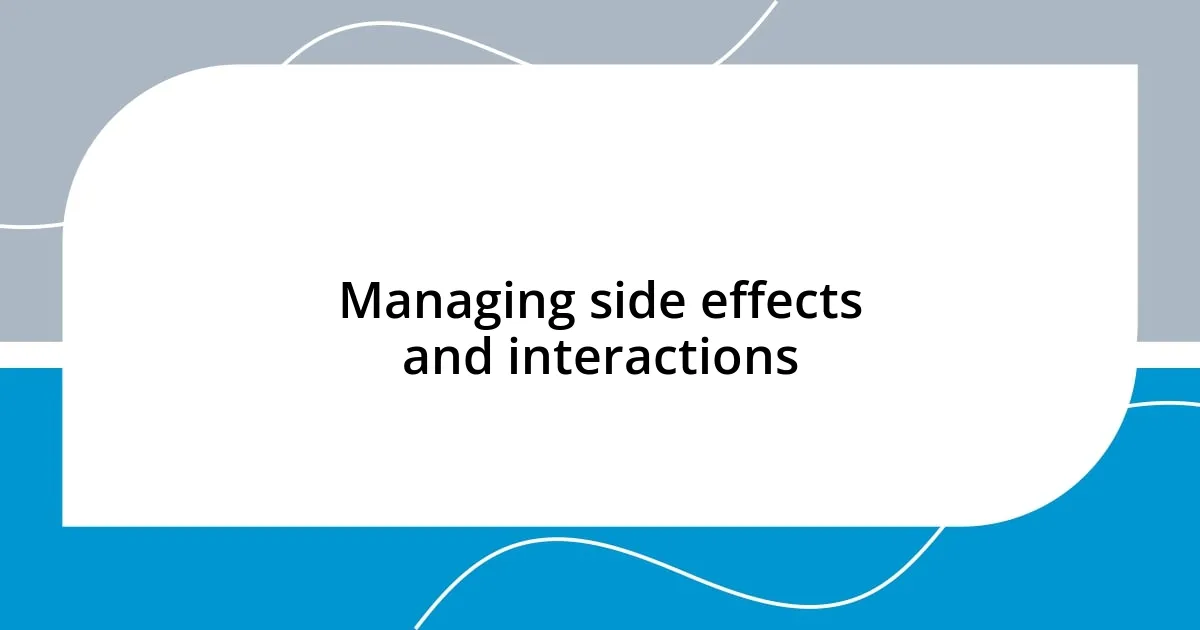
Managing side effects and interactions
Managing side effects is an integral part of my medication journey. I learned early on that tracking how I felt after each dose helped me identify patterns. One time, I noticed that my energy levels would plummet after taking a specific medication. This revelation prompted me to talk to my doctor, and together we found an alternative that didn’t leave me feeling drained. Have you ever considered how simple observations could lead to significant changes in your treatment?
Interactions between medications can sometimes feel like navigating a complex maze. I’ve had a couple of close calls where new prescriptions clashed with my existing ones. When I felt dizziness after starting a new medication, I realized I hadn’t double-checked compatibility. From then on, I always make it a point to research or consult my pharmacist about potential interactions. It’s a small step that brings immense peace of mind—why wouldn’t you take that extra precaution?
Another tip I swear by is maintaining an updated medication list. I carry it with me everywhere—like a trusty sidekick. When I visited a specialist last year, having that list on hand made a huge difference. We quickly spotted a potential interaction that could have been detrimental. That moment reinforced my belief that a proactive approach can enhance safety and efficiency in my medication management. Have you thought about what you could discover by keeping a simple list?
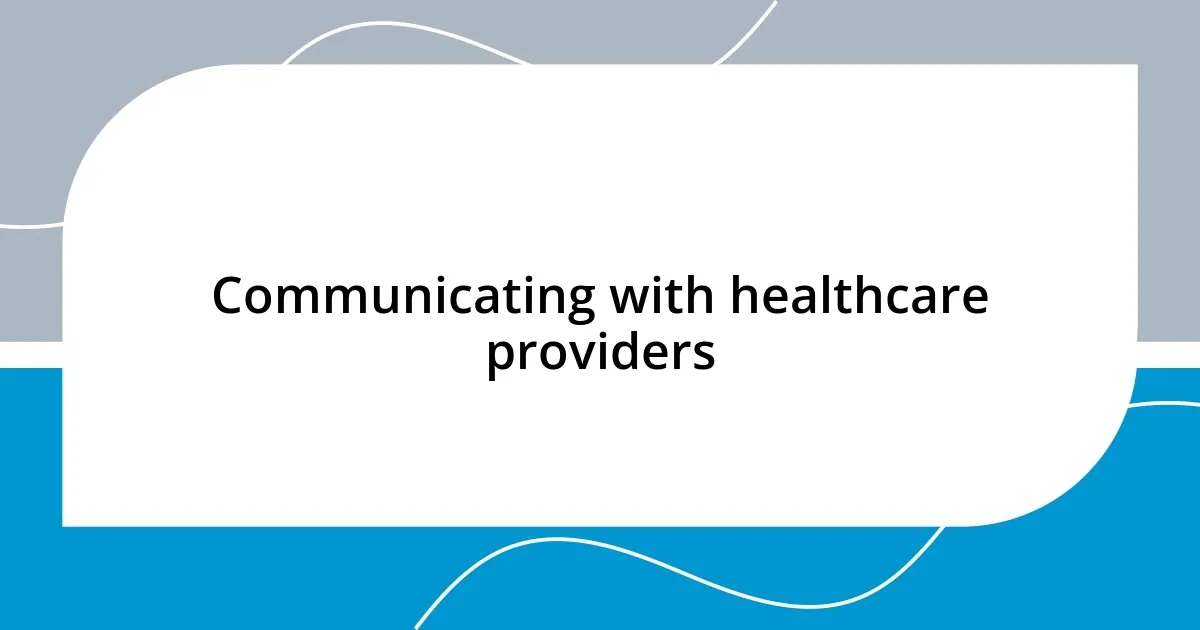
Communicating with healthcare providers
When it comes to communicating with healthcare providers, I’ve found that being open and honest is crucial. I remember a time when I hesitated to share my concerns about a new medication. My doctor likely would have appreciated my input, and it could have prevented some uncomfortable side effects. Have you ever felt hesitant to speak up? Trust me, a candid conversation can make all the difference.
Another strategy that has worked wonders for me is preparing for appointments. I usually jot down my questions or concerns beforehand, so I don’t forget when I’m finally face-to-face with my healthcare team. It’s incredible how much more empowered I feel when I walk into an appointment with a clear agenda. Honestly, it transforms a potentially nerve-wracking experience into a collaborative dialogue where my voice is heard.
Additionally, I’ve found that following up after appointments is just as important as the initial conversation. After discussing changes to my medication, I make it a point to send a quick email or call the office to clarify any lingering doubts. This practice not only reinforces my understanding but also builds a stronger relationship with my healthcare provider. Have you thought about how simple follow-ups could enhance your communication experience?
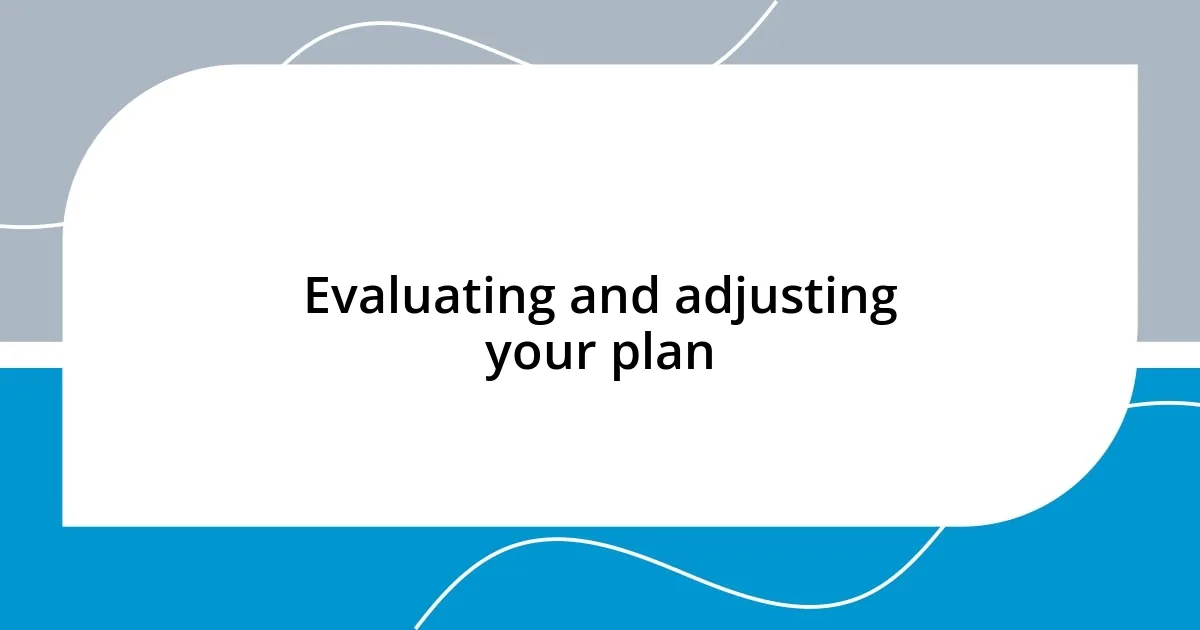
Evaluating and adjusting your plan
Evaluating and adjusting my medication plan is something I take seriously, and it’s a continuous process for me. Maybe it’s just me, but I’ve found that my needs can change over time—what worked a year ago may not be effective today. For instance, I noticed I was becoming more anxious after a dosage increase one time, which led me to revisit my regimen with my healthcare provider. Have you ever felt like your body was signaling for a change, but you weren’t sure what to do?
Listening to those subtle cues is vital. I once kept a journal for a month, logging my mood and physical sensations after taking my medications. Those entries revealed a pattern I hadn’t noticed before: a specific time of day when my anxiety peaked. By sharing my findings with my doctor, we could adjust my medication timing effectively. How often do you reflect on how a medication truly affects you?
Adjusting isn’t just about dosage; it’s also about the overall strategy. For instance, I started incorporating mindfulness techniques along with my meds to enhance their effectiveness. When I first tried this holistic approach, I felt an undeniable shift in my well-being. It’s fascinating how combining different methods can lead to a more tailored and effective treatment plan. If you look beyond just the pills, might you discover solutions that resonate more deeply with your experience?

